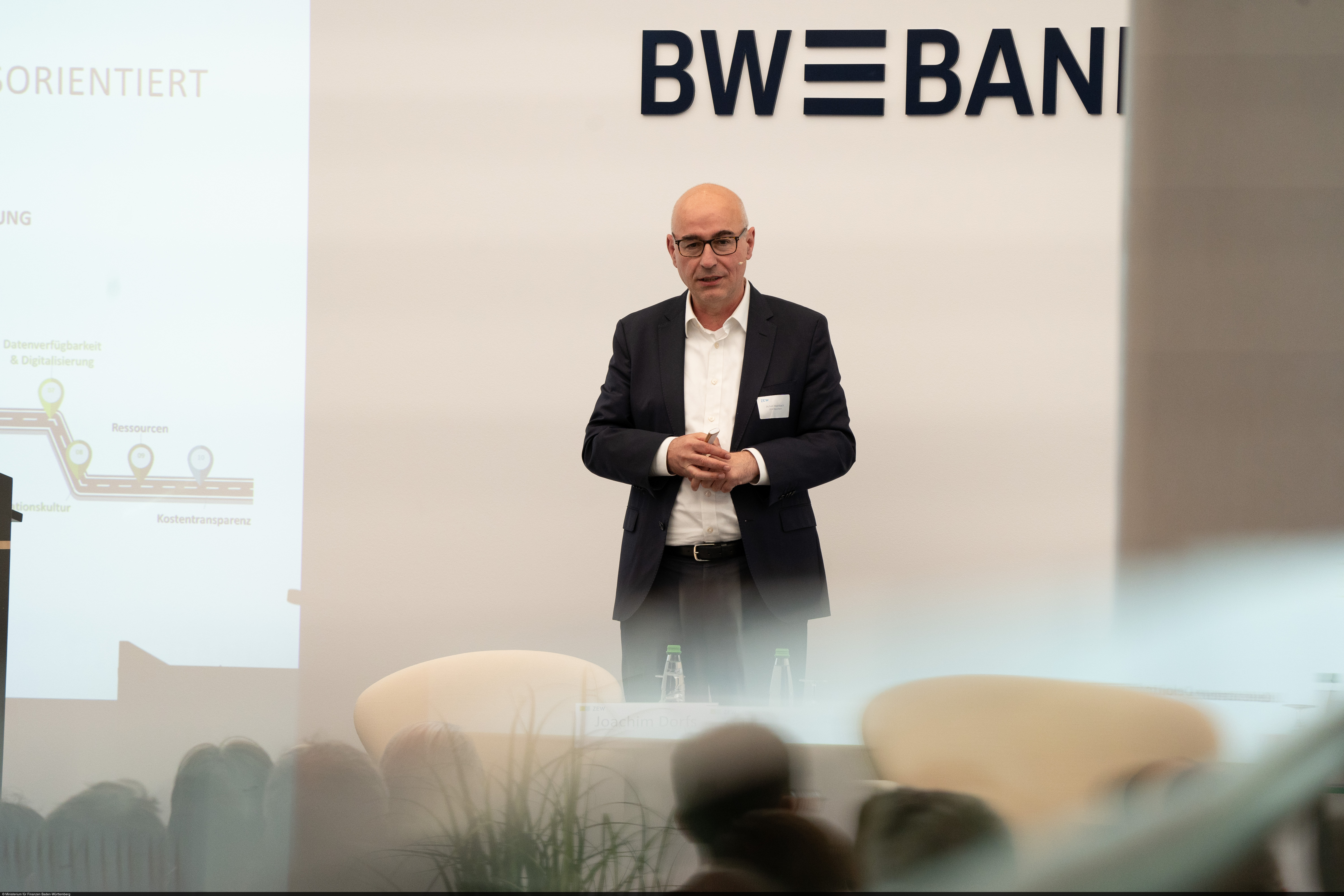Budget Management: Money Alone Does Not Solve Problems
Public EventsJoint Panel Discussion by ZEW Mannheim and the Baden-Württemberg Ministry of Finance in Stuttgart on Sustainable Budgets
Federal, state, and municipal budgets are under strain, and tax revenues are declining. On 11 June 2024, ZEW President Professor Achim Wambach emphasised at a joint event by ZEW Mannheim and the Baden-Württemberg Ministry of Finance at BW-Bank Stuttgart that smart fiscal policy should aim to activate private capital. Dr. Danyal Bayaz, Finance Minister of Baden-Württemberg, and Sylvie Goulard, president of the Deutsch-Französisches Institut (dfi) in Ludwigsburg, discussed with Wambach their experiences from Baden-Württemberg, France, and the EU. The debate was moderated by Joachim Dorfs, editor-in-chief of the Stuttgarter Zeitung. Ann-Kristin Stetefeld, board member of BW-Bank, gave the opening address. The event was hosted by BW-Bank, a member of the ZEW Sponsors’ Association, and focused primarily on what future fiscal policy might look like. This topic was of great interest to the audience, which included numerous guests from politics and business, and is one on which ZEW has produced many high-quality research contributions.
“Budget management needs to become more target- and outcome-driven. Together with Deloitte, ZEW Mannheim has created a toolkit with measures and suggestions to address this issue. The question is always: How do we measure the success of policy measures?,” explained Achim Wambach in his keynote speech. Focusing more on the impact of public budgets would be a paradigm shift: “Instead of merely highlighting the large volume of spending, politicians would have to demonstrate the concrete impact of a programme. The evaluation of measures is therefore highly political.”
Saving alone is not the solution
“We need to strengthen our competitiveness. To do this, we need a comprehensive set of measures: relieving companies by abolishing the solidarity surcharge, reforming the basic income to create more incentives to work, and reforming the debt brake to enable future investment,” explained Danyal Bayaz. According to Bayaz, adhering to the debt brake on the one hand and expanding renewable energy on the other are not necessarily contradictory. His approach: “We try to create incentives instead of pursuing a strict austerity policy. I believe the incentives for necessary but uncomfortable reforms are currently lacking. The urgent need for reforms is evident in issues concerning pensions or climate change.”
Sylvie Goulard, former vice-president of the Banque de France, sees debt burdens as a danger, particularly at the European level: “The idea of a debt brake is good because it operates within certain limits. With regard to the necessary infrastructure, Germany and the EU have underestimated the possibility of making exceptions to the debt rule.” Goulard expressed her gratitude to Germany: “Without Germany, we would not have weathered the financial crisis so well. In the future, however, Europe will need to invest more in the military and manage the green transformation at the same time. Germany will have to respond accordingly.”
Is lifting the debt brake a viable measure?
“Is the debt brake still appropriate in its current form, or should there be exceptions?,” asked Joachim Dorfs. According to Achim Wambach, the debt burden in Europe and the repayment obligations of individual countries have reached high levels: “Without Germany’s economic stability, Europe would face significant problems. If Germany takes on too much debt, the stability of the euro is at risk. Nonetheless, Germany still has room for important investments.” One idea is for the government to promote green lead markets to drive transformation more effectively while remaining economically efficient.
How budgets can become more efficient
Based on an expert report prepared by ZEW Mannheim and the auditing firm Deloitte for the German Ministry of Finance, the federal government has continuously developed and strengthened its focus on target- and outcome-driven budget management. The report includes a concrete guide for the widespread use of indicators, and calls for increased use of independent empirical evaluation methods and the promotion of an open evaluation culture. The Federal Cabinet has acknowledged the final report on “Improving performance budgeting in the federal budget, with a particular focus on sustainability”.











